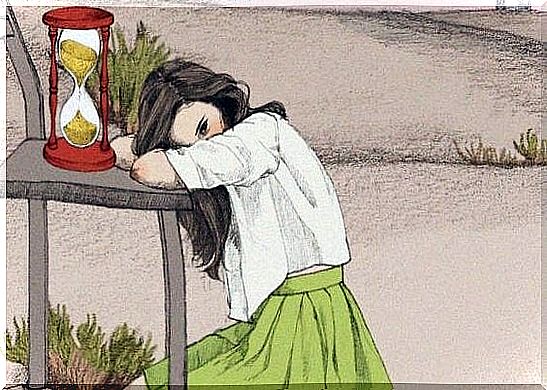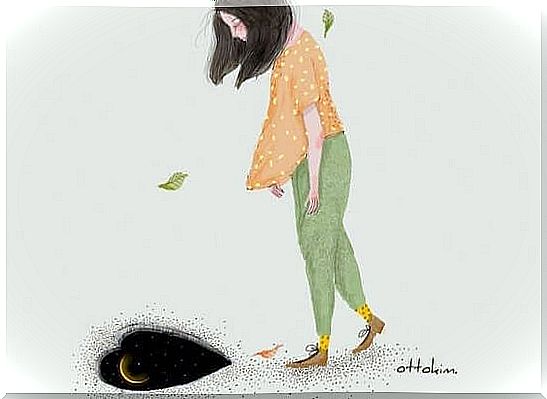Never Adapt To What Doesn’t Make You Happy

Sometimes you can do this, adapt to what doesn’t make you happy, like someone who puts on a shoe by force thinking it’s your size, and gradually discovers that it’s impossible to walk, run, fly… Happiness doesn’t hurt and therefore it does not oppress, hurt, or take the breath away, but allows us to be free, light and masters of our own ways.
A few years ago, a certain soap brand that marketed its product for professional environments launched a special line on the market that was very successful. Printed on the bar of soap itself was the phrase “Hapiness is Busyness” (happiness is being busy).
While it’s true that lines of thought such as Mihaly Csikszentmihalyi’s concept of “flowing” emphasize the idea that focusing on a body and soul task can bring us happiness, in this equation we must undoubtedly add the factor that references to whether or not this task is meaningful to us. In fact, many workers saw the slogan of these soaps with sad irony, because not everyone was happy to carry out a task that, while perhaps bringing economic remuneration, did not necessarily bring psychological well-being.
We could say, almost without fear of making mistakes, that most of us adapt almost forcefully to many of our daily routines, including being aware that they do not bring us happiness (or using the metaphor of shoes, which make us bubbles). It’s like getting on a Ferris wheel that never stops spinning. Life happens nervously and seamlessly, inaccessible and smiling, while we remain captive to our routines…
We adapt to feel secure
As children, our parents tied our shoes or sneakers with a double bow so that we wouldn’t untie and trip. They tucked us under the covers and blankets with extreme affection, they zipped up our coats and jackets so that we were always warm, cared for, and cared for.
We often felt uncomfortable with all this bodily pressure, but if there was one thing we did, it was security. As we get older and take on adult responsibilities, this need to feel secure is still very much present. However, this inexplicable drive for the continual search for security often does not drive our own behavior from awareness.
As curious as this may seem, the most sensitive to this need is our own brain. He doesn’t like changes, risks, much less threats. He’s the one who whispers things like “adapt even if you’re not happy, because security guarantees survival.” However, and this needs to be made clear, adaptation does not always go hand in hand with happiness; among other reasons, because this adaptation often does not happen.

There are those who continue to maintain the bond of their love relationship without there being real love, without true complicity, let alone happiness. The important thing for some is to escape from loneliness, and for that they do not hesitate to adapt to the size of a heart that is not for theirs.
The same happens on a professional level. There are many people who make an effort to be docile, easy to get along with, and even cut down on merits and studies when writing their curriculum because they know it’s the only way to adapt to certain business hierarchies.
It’s as if in our minds there was a new slogan engraved, like that of the soap company mentioned at the beginning: “Adapt or die, resign to survive”.
But… is it really worth dying unhappy?
To be happy you need to make decisions
Although our brain is resistant to change and elegantly invites us to stay in our comfort zone, it is genetically engineered to meet challenges and survive them. In fact, there is a fact related to this specifically that invites us to reflect.
Researchers Richard Herrnstein and Charles Murray defined a concept called the “Flynn Effect” a few years ago. It was observed that, year after year, the Intellectual Quotient scores continue to increase. This is due, among other factors, to the fact that modern life today is increasingly full of stimuli : we have more access to information, we interact more, and our children now process all this data, all these stimuli faster and faster. related to new technologies.

But there is a fundamental aspect to which psychologists, psychiatrists, sociologists and anthropologists are very attentive: a high IQ does not always go hand in hand with happiness. It seems that this matter of being happy and having a stronger and more extensive neurological fabric does not always guarantee our psychological well-being. It’s strange and heartbreaking at the same time.
What’s going on then? We adapt to this information society, but at the same time, we close ourselves in our comfort zones as one who watches life go by, imagining a false happiness, a target that in moments lapses and leads us to stress and anxiety…
We forget, perhaps, that to be happy we need to make decisions, that we need to get rid of tight shoes and dare to walk barefoot, we forget that love has no reason to hurt, that docility at work ends up burning us and that, sometimes we have to do this, we have to challenge those who are in charge and go out the door to create our own path. Our own happiness.
How about starting today?
Images courtesy of Ottdim and Hcojiscom.









